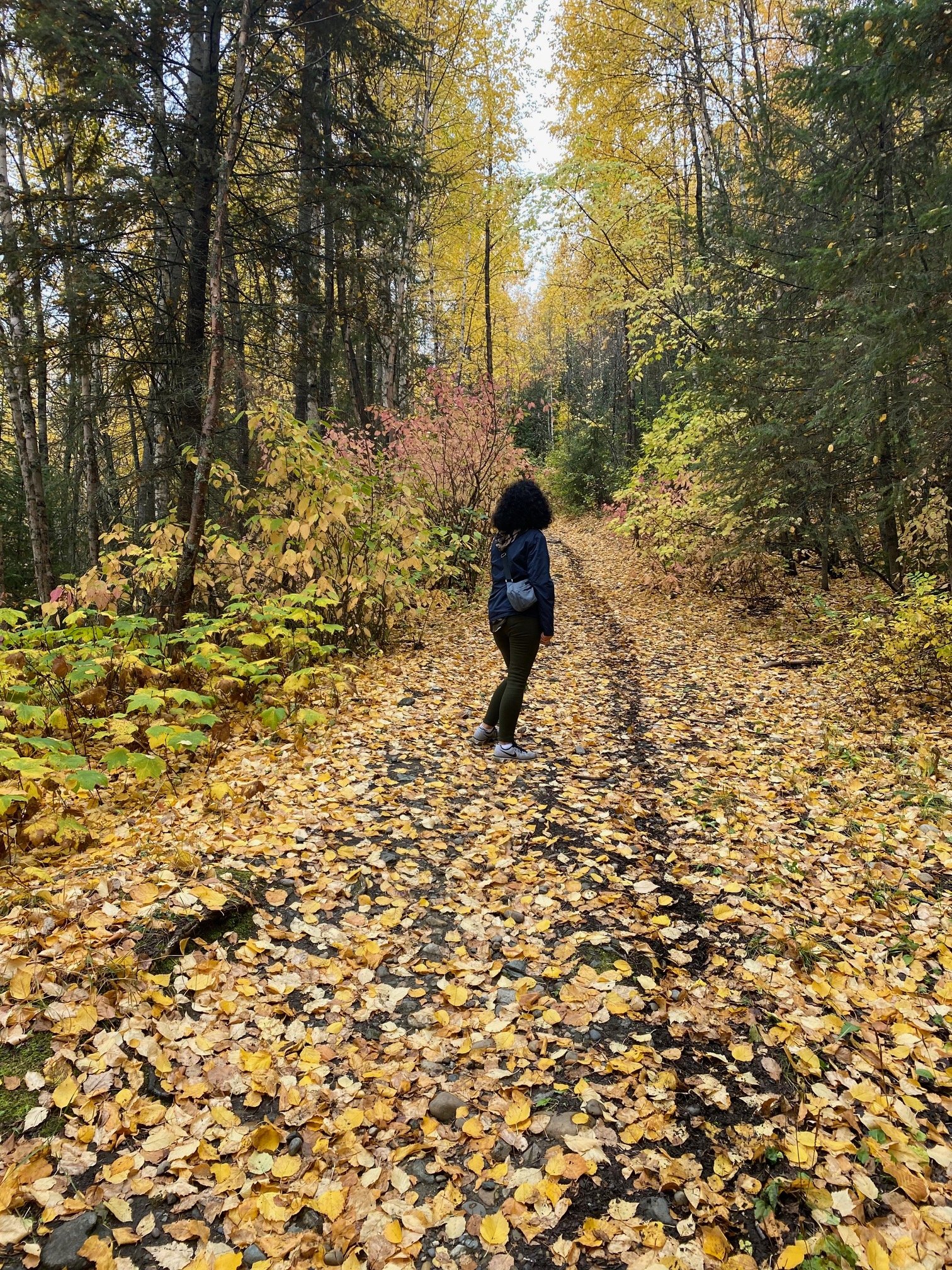Land-Based Etiquette and Values
Stay at least 50 meters away from the roads to ensure your plants are not contaminated. Be sure to harvest plants that are healthy and come from healthy plant communities.
Give thanks to the Creator for the living gifts you are given and for your harvest. Remember All plants are living beings.
Acknowledge the territory and the Indigenous People’s land you are on.
Never harvest anything unless you’re 100% certain you have identified it correctly. Always check in with a knowledgeable person before using any plant in or on your body. Be sure to study your plant and visit the plant a few times to be sure that this plant is the plant you need.
Never take more than what you need. Never take more than what you can process that day, this shows respect for the land and plants. This will strengthen the power of your medicine. Never take more than what you will use within the four seasons.
Always have good thoughts when harvesting and processing. Never bring your troubles into your harvest, so that the medicine will be good.
Always ask permission from the plant to harvest it and let the plant know what you are harvesting it for. Remember you are taking from a living being.
Wherever possible, leave root systems in place so the plants can continue to grow. There is medicine in all parts of the plant so if you can leave the root system undisturbed, so future harvests can be made.
If you do harvest roots, cover the holes back up again.
Leave the area you harvest from in good condition, and put any leftover plants back to the ground.
Cause no damage, and leave no litter behind. Watch where you are stepping
Once you harvest, leave a gift to show your appreciation. Always process your plants within a few hours of harvesting. This shows respect to our plants and will make your medicine strong.
Enjoy your time in nature and appreciate all that they do for us!
Local Plant Medicine Knowledge
Local Plant Medicine Knowledge
Experience the Magic of Land-Based Learning (In-class) Workshop
At Plants4Healing, we firmly believe that connecting with nature goes beyond reading about it or simply observing from a distance. To truly understand and appreciate the beauty and benefits of local indigenous plants, we encourage a hands-on approach that engages all five senses. Today, we embark on a journey of discovery and connection as we explore several local indigenous plants through touch, sight, smell, taste, and even sound.
Touch: By touching these plants, we establish a physical connection, feeling their unique textures and understanding their adaptations to survive in their environment.
Sight: Taking a closer look at our plants, we marvel at the vibrant colors and intricate patterns nature has to offer. Through our sense of sight, we witness the captivating beauty and diversity of our local indigenous plants.
Smell: Inhale and smell the natural essential oils to awaken your senses. Our sense of smell helps us discover the aromatherapy potential of these indigenous plants, connecting us to their beneficial properties.
Taste: Edible plants offer exploration of tastes and textures to our palate. Through taste, we deepen our connection to the plant and appreciate the nourishing gifts it provides.
Sound: Probably the most important sense in this workshop because for traditional knowledge to be passed down, you must listen.
Join us at Plants4Healing as we continue to explore and celebrate the wonders of the natural world through our five senses – a journey that unwraps the secrets that lie within and strengthens our bond with the earth.
Traditional Indigenous Teas
Indigenous Teas
The indigenous peoples of Northern BC have held a profound understanding of the healing powers of plants for thousands of years. Their ancient knowledge and wisdom have been passed down through generations, allowing us to learn about the traditional healing teas that have provided comfort and relief in this rugged terrain. Here are five teas that have been cherished by the indigenous peoples of Northern BC:
Labrador Mint Tea: Mentha arvensis plant from Northern BC's forests. Leaves are refreshing and have medicinal benefits. Traditionally used for digestion, headaches, and respiratory health. Soothing physically and emotionally.
Spruce & Fir Tea: Indigenous peoples in Northern BC use these trees for invigorating tea rich in vitamin C, boosting immunity. It helps with coughs, congestion, and tastes great with honey.
Rose Hips & Bark Tea: Indigenous people use rose hips for vitamin C and antioxidants. With tree bark like willow or poplar, this tea is a strong healer. It eases joint pain and cold symptoms. The tea is tasty, colorful, and nourishing.
Birch Bark Tea: Northern BC's birch trees provide more than beauty. Indigenous people have long used the bark to make a refreshing, healing tea. It soothes arthritis, detoxifies, and supports urinary health. Enjoy its unique sweet and bitter taste.
Yarrow Tea: Wild plant in Northern BC with powerful medicinal properties. Treats fevers, aids digestion, and relieves menstrual discomfort. Add lemon or honey to personalize the earthy, slightly bitter taste.
Land Based Learning
Experience the Magic of Land-Based Learning Outside -Workshop
Our Land-Based Learning Workshop awakens senses and engages with plants. We will walk where our ancestors walked and learn to identify our local plants and their medicinal uses, and practice sustainability. Immerse in nature to understand plant-human interconnectedness. Touch, taste, and experience therapeutic benefits. Indigenous plant knowledge imparted by wise plant guardians. Preserve indigenous knowledge and ecosystems. Join our journey of learning and discovery. Practice responsible and respectful interaction with nature. Reserve your spot today and be amazed and transformed by plant healing.

Precautions for Traditional Plant Medicine Usage
When using traditional plant medicine, exercise caution as with any other medication. Refrain from ingesting unfamiliar plants, as some may be harmful. Seek guidance from a professional or traditional plant knowledge keeper before use. This information is for educational purposes only and not healthcare advice. Consult a medical professional before using herbal remedies.










